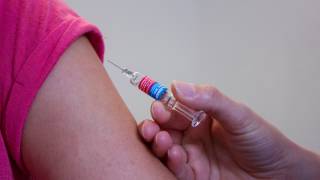Personalized Cancer Vaccine May Eliminate Tumors

New cancer vaccines help patients fight cancer by enlisting the person’s own immune systems to attack cancer cells. A new personalized vaccine candidate showed very positive results in a small clinical research study.
Ideally, any cancer treatment or vaccine would target cancerous cells while sparing healthy cells.
In this approach, vaccines could help the immune system recognize such cells as harmful, prompting the system to enlist T cells, and other defender cells, to seek out and eliminate cancers.
According to previous research, the nature of the antigens that allow the immune system to distinguish cancer cells from non-cancer cells has long remained obscure.
The immune system is a complex network of cells, tissues, organs, and the substances they make that helps the body fight infections and other diseases.
Cancer vaccines can either be made individually with one person's melanoma cells and used to treat just that person, or using lots of different melanoma antigens from different melanomas and used to treat many people.
In this limited study, researchers used an experimental cancer vaccine to treat a small selected patient group who had melanoma. The tumors completely disappeared in 50 percent of the patients after they were given their cancer vaccine.
Skin cancer is the most common form of cancer in the USA. Melanoma skin cancer is common and costly.
People of any skin color can get skin cancer however, people with lighter skin are at higher risk.
More than 65,000 melanoma skin cancers were diagnosed in the US in 2011.
Melanoma can be disfiguring and even deadly; deaths increase with age and are higher for men than women.
The annual cost for treating melanoma has grown faster than the annual treatment costs for all cancers combined.
The annual cost of treating new melanoma patients is projected to triple from 2011 through 2030 (from $457 million to $1.6 billion).
Using proven community skin cancer prevention programs could prevent an estimated 21,000 melanomas and save $250 million per year by 2030.
These scientists detailed their findings on July 5, 2017 in the journal Nature. This study was a Phase I clinical trial, meaning they were carried out with a small number of patients to test the safety of the treatment, and find the best dose of a new treatment with the fewest side effects.
These researchers did not disclose any conflicts of interest.
Our Trust Standards: Medical Advisory Committee
























